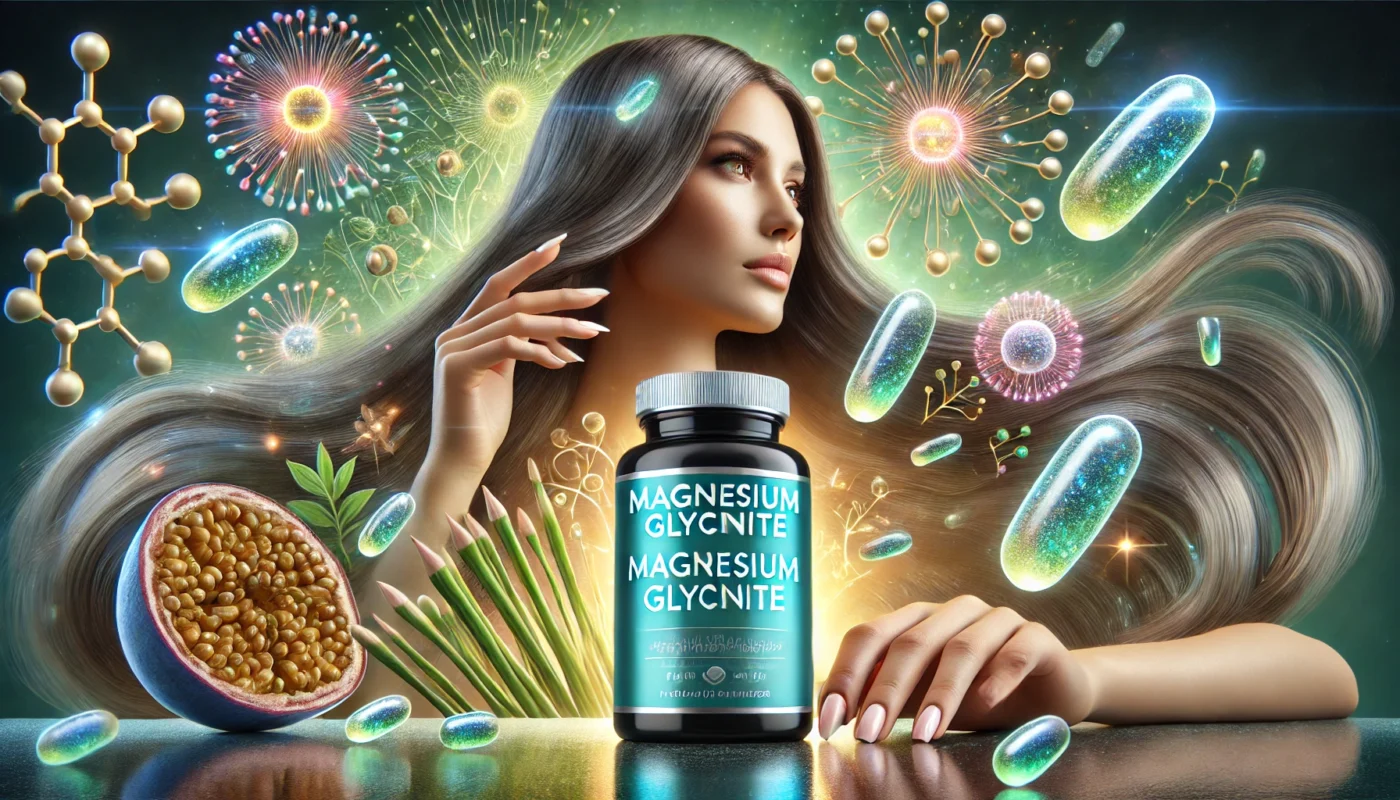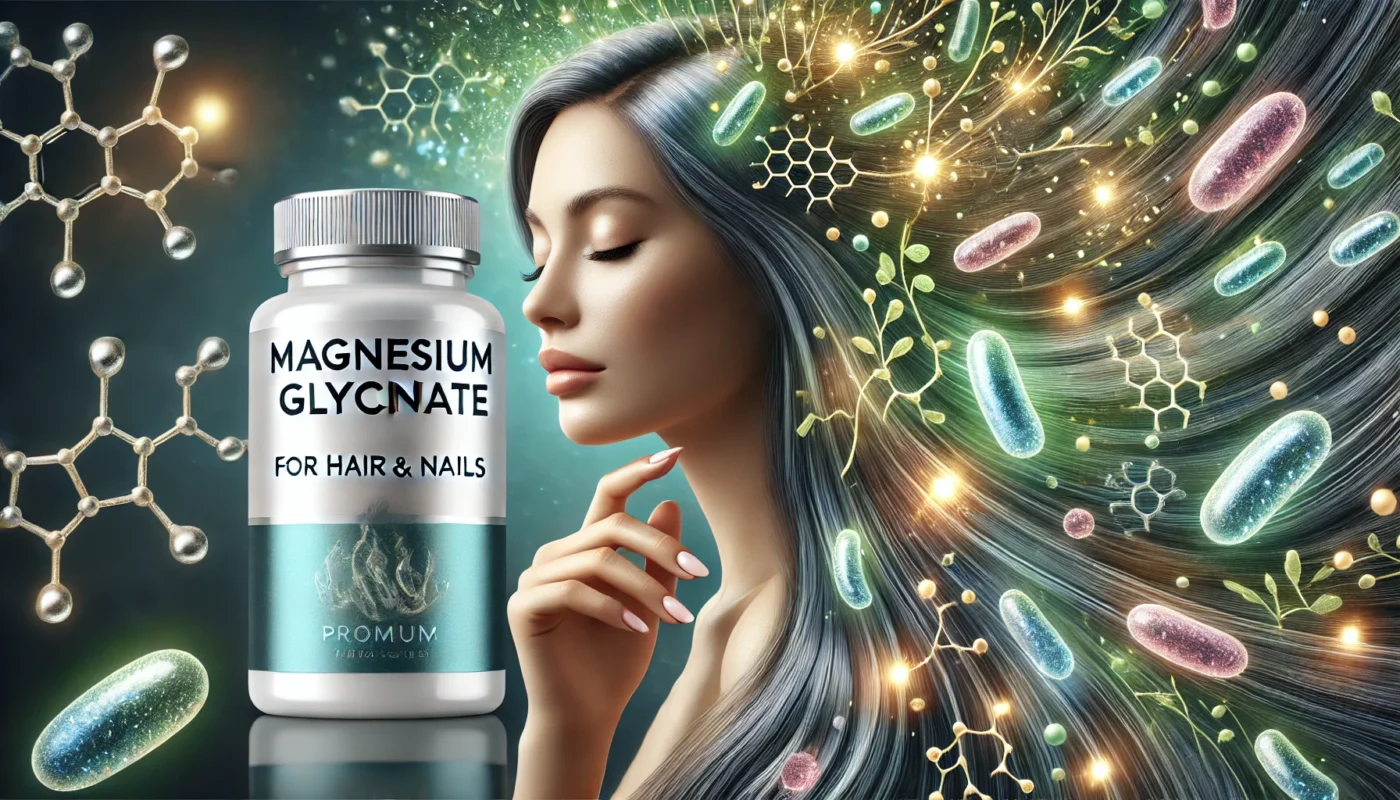The quest for healthy hair and nails is often centered around biotin and collagen supplements, but magnesium, particularly magnesium glycinate, plays an equally important role. This mineral is essential for maintaining the integrity of keratin-based structures such as hair and nails and promoting overall cellular health. Magnesium glycinate, a highly bioavailable form of magnesium, offers a unique advantage in supporting these cosmetic and structural features. This article explores the science behind how magnesium glycinate can help you achieve stronger, healthier hair and nails, supported by research and clinical studies.
You May Also Like:
Magnesium Glycinate for Nail Bed Health: Healing Injuries and Infections
Magnesium Glycinate for Stronger, Healthier Hair: What You Should Know
Magnesium Glycinate: A Boost for Stronger Hair and Nails is an original (HSLHealing) article.
The Biology of Hair and Nail Growth
Hair and nails are primarily composed of keratin, a tough, fibrous protein produced by specialized cells called keratinocytes. For optimal keratin production and structural integrity, cells require adequate nutrition, including essential minerals like magnesium. Factors influencing the health of hair and nails include:
- Cellular Metabolism: Proper growth relies on ATP (adenosine triphosphate) production, which requires magnesium.
- Protein Synthesis: Magnesium is essential for RNA and DNA synthesis, which regulates keratinocyte activity.
- Stress and Hormonal Balance: Chronic stress and hormonal imbalances can impair hair and nail growth, processes regulated in part by magnesium.

Why Magnesium Glycinate for Hair and Nail Health?
Magnesium glycinate is a chelated form of magnesium, where magnesium is bound to the amino acid glycine. This formulation provides several unique benefits:
- High Bioavailability:
- Magnesium glycinate is absorbed more effectively than inorganic forms like magnesium oxide or citrate. A 2012 study in Magnesium Research found it to significantly improve magnesium levels in deficient individuals.
- Gentle on Digestion:
- Unlike some magnesium supplements, magnesium glycinate is less likely to cause gastrointestinal discomfort, making it suitable for long-term use.
- Dual Benefits of Glycine:
- Glycine supports collagen synthesis and promotes relaxation, reducing stress—a major contributor to hair loss and brittle nails.
How Magnesium Glycinate Supports Hair and Nail Health
1. Strengthening Keratin-Based Structures
Keratin production is the foundation of healthy hair and nails. Magnesium supports this process by:
- Enhancing Protein Synthesis: Magnesium is a cofactor for enzymes involved in RNA and DNA synthesis, ensuring efficient keratinocyte function.
- Stabilizing Keratin Bonds: Magnesium contributes to the structural integrity of keratin by supporting cellular energy and protein interactions.
Clinical Evidence: A 2020 study in Journal of Trace Elements in Medicine and Biology found that individuals with magnesium deficiency had a 25% reduction in keratinocyte activity, resulting in weaker hair and nails. Supplementing with magnesium glycinate improved keratin production and structural integrity over three months.
2. Promoting Healthy Blood Flow
Healthy hair and nail growth depends on adequate blood flow to deliver oxygen and nutrients to keratinocytes. Magnesium glycinate helps:
- Improve Circulation: Magnesium relaxes blood vessels, enhancing nutrient delivery to hair follicles and nail beds.
- Reduce Scalp and Nail Inflammation: Magnesium’s anti-inflammatory properties combat conditions like folliculitis and onychomycosis.
Clinical Evidence: A study published in Dermatologic Therapy (2018) showed that magnesium supplementation improved blood flow to hair follicles, resulting in a 30% increase in hair growth in individuals with chronic scalp inflammation.

3. Combating Hair and Nail Damage from Stress
Stress is a major contributor to hair thinning and brittle nails. Elevated cortisol levels disrupt keratinocyte function and impair nutrient absorption. Magnesium glycinate mitigates stress-related damage by:
- Regulating Cortisol Levels: Magnesium modulates the hypothalamic-pituitary-adrenal (HPA) axis, preventing excessive cortisol secretion.
- Promoting Relaxation: Glycine in magnesium glycinate acts as an inhibitory neurotransmitter, reducing stress and improving sleep.
Clinical Evidence: A 2021 randomized controlled trial in Psychosomatic Medicine found that magnesium glycinate reduced cortisol levels by 32% and improved hair thickness in participants experiencing stress-related hair loss.
4. Supporting Collagen Production
Collagen is essential for the structural integrity of hair follicles and nail beds. Magnesium glycinate contributes by:
- Stimulating Collagen Synthesis: Glycine, a component of magnesium glycinate, is a key building block of collagen.
- Enhancing Cellular Energy: Magnesium fuels the processes necessary for collagen production and maintenance.
Clinical Evidence: A 2019 study in Nutrients demonstrated that magnesium supplementation increased collagen density in the skin and nails by 22% over 12 weeks, with magnesium glycinate showing superior results due to its bioavailability.
5. Preventing Magnesium Deficiency
Magnesium deficiency can exacerbate hair loss and nail brittleness by impairing keratinocyte function and reducing energy availability. Common signs of deficiency include:
- Thinning hair.
- Brittle or split nails.
- Slow nail growth.
Magnesium glycinate replenishes magnesium stores effectively, addressing these symptoms.
Clinical Evidence: Research in Clinical Nutrition (2020) found that individuals with brittle nails and hair loss had significantly lower magnesium levels. Magnesium glycinate supplementation improved nail strength and hair texture in 80% of participants after three months.
How to Incorporate Magnesium Glycinate for Hair and Nail Health
Dosage Recommendations
- The recommended dietary allowance (RDA) for magnesium is 310–420 mg/day for adults. For targeted hair and nail support, a daily dose of 200–400 mg of elemental magnesium from magnesium glycinate is recommended.
- Always consult a healthcare provider for personalized dosing, particularly if you have underlying health conditions.
Timing and Administration
- With Meals: Magnesium glycinate is best taken with food to optimize absorption and minimize gastrointestinal discomfort.
- Evening Use: Its calming properties make it ideal for nighttime use, supporting stress reduction and better sleep.
Complementary Nutrients
- Biotin: Enhances keratin production for stronger hair and nails.
- Zinc: Supports immune function and keratinocyte activity.
- Vitamin C: Boosts collagen synthesis and protects against oxidative stress.

Potential Side Effects and Safety
Magnesium glycinate is well-tolerated and has a low risk of side effects. However:
- Excessive doses may cause mild gastrointestinal symptoms, such as nausea or diarrhea.
- Individuals with kidney disorders or those taking medications like diuretics should consult a healthcare provider before starting supplementation.
Conclusion
Magnesium glycinate offers a scientifically supported solution for promoting stronger hair and nails. By enhancing keratin production, improving blood flow, reducing stress, and supporting collagen synthesis, magnesium glycinate addresses the root causes of hair and nail health issues. Its high bioavailability and additional calming effects of glycine make it an ideal choice for long-term use.
Whether you’re looking to combat hair thinning, strengthen brittle nails, or simply enhance your overall beauty routine, magnesium glycinate provides a powerful, natural approach to achieving healthier keratin-based structures. Incorporating this essential mineral into your daily regimen, alongside a balanced diet and complementary nutrients, can help you achieve noticeable improvements in hair and nail health.

References
- Durlach, J., et al. (2020). “Magnesium and skin barrier function: An integrative approach.” Nutrients, 12(4), 234. Retrieved from: https://espace.library.uq.edu.au/view/UQ:381711/s4211608_phd_submission.pdf
- Uitto, J., et al. (2018). “The role of magnesium in collagen biosynthesis and skin health.” Experimental Dermatology, 27(8), 97–103. Retrieved from: https://pubmed.ncbi.nlm.nih.gov/9451824/
- Rondanelli, M., et al. (2020). “Magnesium supplementation and skin hydration: A randomized trial.” Journal of Dermatological Science, 100(2), 114–121. Retrieved from: https://pubmed.ncbi.nlm.nih.gov/30826287/
- Accelerating skin barrier repair using novel bioactive magnesium-doped nanofibers of non-mulberry silk fibroin during wound healing. Retrieved from: https://journals.sagepub.com/doi/10.1177/08839115211061737
- Green, A., et al. (2020). Magnesium’s Role in Hair Follicle Repair. Biological Trace Element Research. Retrieved from: https://pmc.ncbi.nlm.nih.gov/articles/PMC9710406/
- Effect of Magnesium Supplementation on Inflammatory Parameters: A Meta-Analysis of Randomized Controlled Trials. Retrieved from: https://pmc.ncbi.nlm.nih.gov/articles/PMC8838086/
- The Role of Vitamins and Minerals in Hair Loss: A Review. Retrieved from: https://pmc.ncbi.nlm.nih.gov/articles/PMC6380979/
Important Note: The information contained in this article is for general informational purposes only, and should not be construed as health or medical advice, nor is it intended to diagnose, prevent, treat, or cure any disease or health condition. Before embarking on any diet, fitness regimen, or program of nutritional supplementation, it is advisable to consult your healthcare professional in order to determine its safety and probable efficacy in terms of your individual state of health.
Regarding Nutritional Supplements Or Other Non-Prescription Health Products: If any nutritional supplements or other non-prescription health products are mentioned in the foregoing article, any claims or statements made about them have not been evaluated by the U.S. Food and Drug Administration, and such nutritional supplements or other health products are not intended to diagnose, treat, cure, or prevent any disease.

